Organisational Behaviour Report: Next Plc, Motivation, Teams
VerifiedAdded on 2023/06/08
|14
|4001
|342
Report
AI Summary
This report examines organisational behaviour within the context of Next Plc, a UK-based company. It explores the influence of organisational culture, power dynamics, and politics on individual and team performance. The report delves into content and process motivational theories, including Maslow's hierarchy of needs, Herzberg's two-factor theory, Vroom's expectancy theory, and Adam's equity theory, analyzing their application within the company. It differentiates between effective and ineffective teams, highlighting characteristics that contribute to success and failure. Furthermore, the report applies organisational behaviour philosophies to a business situation, providing a comprehensive analysis of workplace dynamics and their impact on employee behaviour and organizational outcomes.
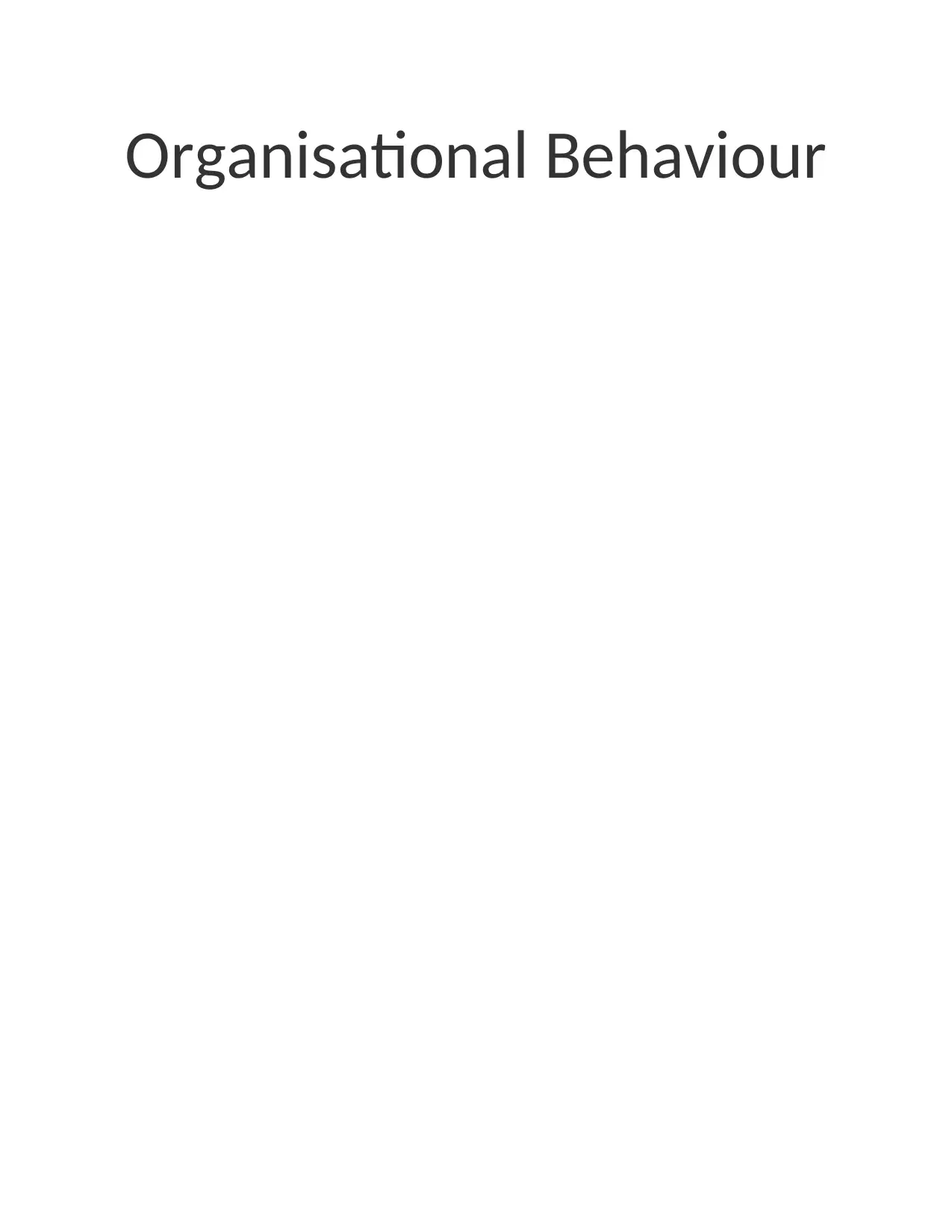
Organisational Behaviour
Paraphrase This Document
Need a fresh take? Get an instant paraphrase of this document with our AI Paraphraser
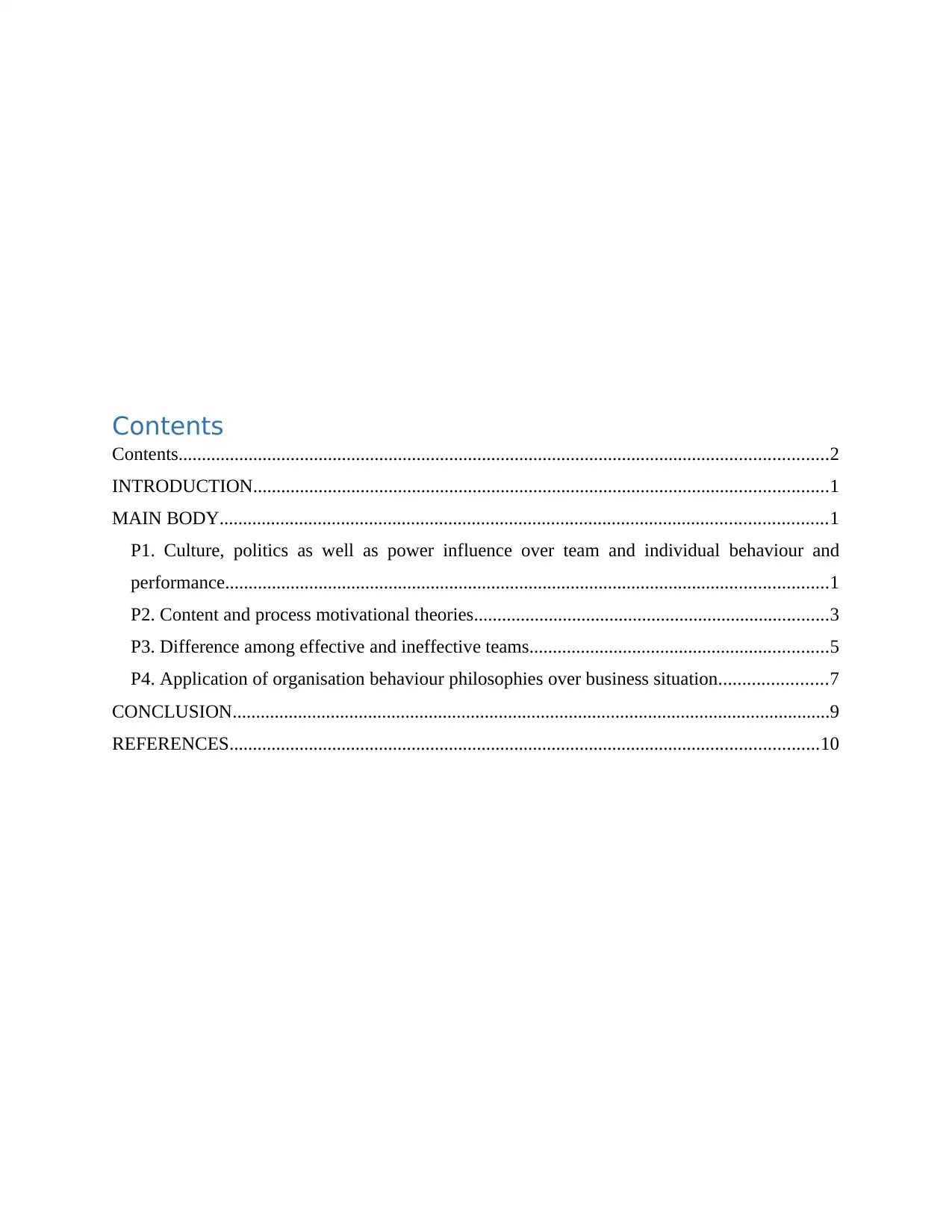
Contents
Contents...........................................................................................................................................2
INTRODUCTION...........................................................................................................................1
MAIN BODY..................................................................................................................................1
P1. Culture, politics as well as power influence over team and individual behaviour and
performance.................................................................................................................................1
P2. Content and process motivational theories............................................................................3
P3. Difference among effective and ineffective teams................................................................5
P4. Application of organisation behaviour philosophies over business situation.......................7
CONCLUSION................................................................................................................................9
REFERENCES..............................................................................................................................10
Contents...........................................................................................................................................2
INTRODUCTION...........................................................................................................................1
MAIN BODY..................................................................................................................................1
P1. Culture, politics as well as power influence over team and individual behaviour and
performance.................................................................................................................................1
P2. Content and process motivational theories............................................................................3
P3. Difference among effective and ineffective teams................................................................5
P4. Application of organisation behaviour philosophies over business situation.......................7
CONCLUSION................................................................................................................................9
REFERENCES..............................................................................................................................10

⊘ This is a preview!⊘
Do you want full access?
Subscribe today to unlock all pages.

Trusted by 1+ million students worldwide
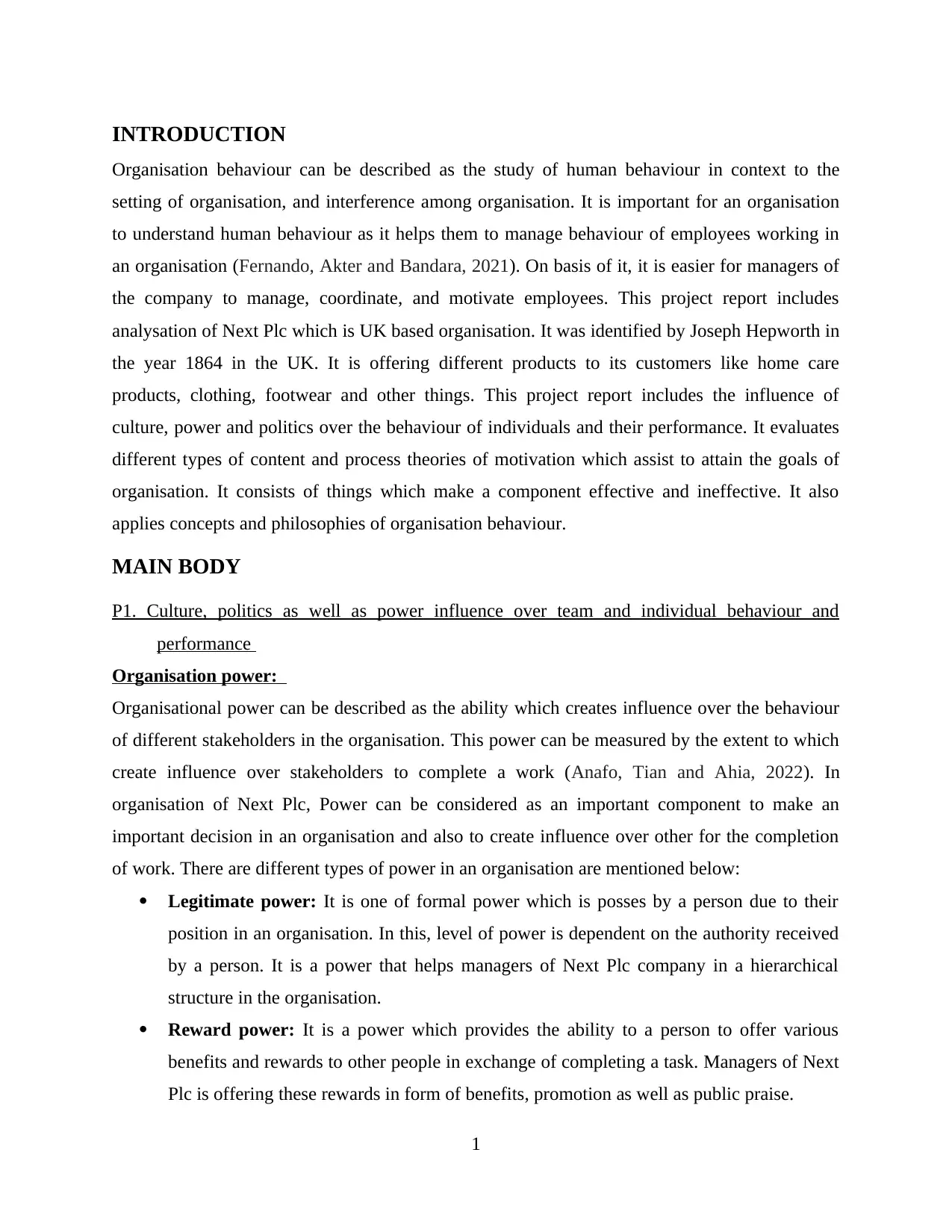
INTRODUCTION
Organisation behaviour can be described as the study of human behaviour in context to the
setting of organisation, and interference among organisation. It is important for an organisation
to understand human behaviour as it helps them to manage behaviour of employees working in
an organisation (Fernando, Akter and Bandara, 2021). On basis of it, it is easier for managers of
the company to manage, coordinate, and motivate employees. This project report includes
analysation of Next Plc which is UK based organisation. It was identified by Joseph Hepworth in
the year 1864 in the UK. It is offering different products to its customers like home care
products, clothing, footwear and other things. This project report includes the influence of
culture, power and politics over the behaviour of individuals and their performance. It evaluates
different types of content and process theories of motivation which assist to attain the goals of
organisation. It consists of things which make a component effective and ineffective. It also
applies concepts and philosophies of organisation behaviour.
MAIN BODY
P1. Culture, politics as well as power influence over team and individual behaviour and
performance
Organisation power:
Organisational power can be described as the ability which creates influence over the behaviour
of different stakeholders in the organisation. This power can be measured by the extent to which
create influence over stakeholders to complete a work (Anafo, Tian and Ahia, 2022). In
organisation of Next Plc, Power can be considered as an important component to make an
important decision in an organisation and also to create influence over other for the completion
of work. There are different types of power in an organisation are mentioned below:
Legitimate power: It is one of formal power which is posses by a person due to their
position in an organisation. In this, level of power is dependent on the authority received
by a person. It is a power that helps managers of Next Plc company in a hierarchical
structure in the organisation.
Reward power: It is a power which provides the ability to a person to offer various
benefits and rewards to other people in exchange of completing a task. Managers of Next
Plc is offering these rewards in form of benefits, promotion as well as public praise.
1
Organisation behaviour can be described as the study of human behaviour in context to the
setting of organisation, and interference among organisation. It is important for an organisation
to understand human behaviour as it helps them to manage behaviour of employees working in
an organisation (Fernando, Akter and Bandara, 2021). On basis of it, it is easier for managers of
the company to manage, coordinate, and motivate employees. This project report includes
analysation of Next Plc which is UK based organisation. It was identified by Joseph Hepworth in
the year 1864 in the UK. It is offering different products to its customers like home care
products, clothing, footwear and other things. This project report includes the influence of
culture, power and politics over the behaviour of individuals and their performance. It evaluates
different types of content and process theories of motivation which assist to attain the goals of
organisation. It consists of things which make a component effective and ineffective. It also
applies concepts and philosophies of organisation behaviour.
MAIN BODY
P1. Culture, politics as well as power influence over team and individual behaviour and
performance
Organisation power:
Organisational power can be described as the ability which creates influence over the behaviour
of different stakeholders in the organisation. This power can be measured by the extent to which
create influence over stakeholders to complete a work (Anafo, Tian and Ahia, 2022). In
organisation of Next Plc, Power can be considered as an important component to make an
important decision in an organisation and also to create influence over other for the completion
of work. There are different types of power in an organisation are mentioned below:
Legitimate power: It is one of formal power which is posses by a person due to their
position in an organisation. In this, level of power is dependent on the authority received
by a person. It is a power that helps managers of Next Plc company in a hierarchical
structure in the organisation.
Reward power: It is a power which provides the ability to a person to offer various
benefits and rewards to other people in exchange of completing a task. Managers of Next
Plc is offering these rewards in form of benefits, promotion as well as public praise.
1
Paraphrase This Document
Need a fresh take? Get an instant paraphrase of this document with our AI Paraphraser
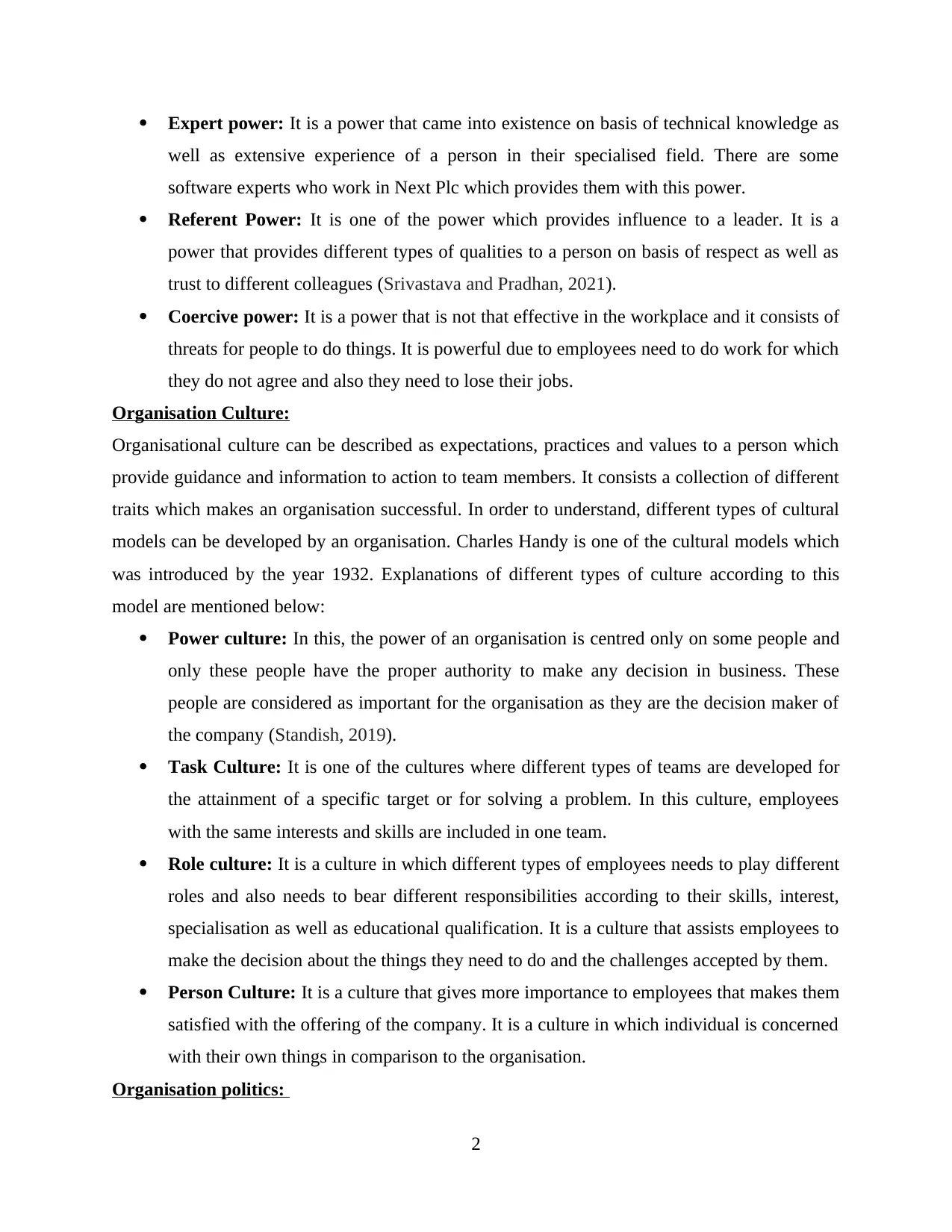
Expert power: It is a power that came into existence on basis of technical knowledge as
well as extensive experience of a person in their specialised field. There are some
software experts who work in Next Plc which provides them with this power.
Referent Power: It is one of the power which provides influence to a leader. It is a
power that provides different types of qualities to a person on basis of respect as well as
trust to different colleagues (Srivastava and Pradhan, 2021).
Coercive power: It is a power that is not that effective in the workplace and it consists of
threats for people to do things. It is powerful due to employees need to do work for which
they do not agree and also they need to lose their jobs.
Organisation Culture:
Organisational culture can be described as expectations, practices and values to a person which
provide guidance and information to action to team members. It consists a collection of different
traits which makes an organisation successful. In order to understand, different types of cultural
models can be developed by an organisation. Charles Handy is one of the cultural models which
was introduced by the year 1932. Explanations of different types of culture according to this
model are mentioned below:
Power culture: In this, the power of an organisation is centred only on some people and
only these people have the proper authority to make any decision in business. These
people are considered as important for the organisation as they are the decision maker of
the company (Standish, 2019).
Task Culture: It is one of the cultures where different types of teams are developed for
the attainment of a specific target or for solving a problem. In this culture, employees
with the same interests and skills are included in one team.
Role culture: It is a culture in which different types of employees needs to play different
roles and also needs to bear different responsibilities according to their skills, interest,
specialisation as well as educational qualification. It is a culture that assists employees to
make the decision about the things they need to do and the challenges accepted by them.
Person Culture: It is a culture that gives more importance to employees that makes them
satisfied with the offering of the company. It is a culture in which individual is concerned
with their own things in comparison to the organisation.
Organisation politics:
2
well as extensive experience of a person in their specialised field. There are some
software experts who work in Next Plc which provides them with this power.
Referent Power: It is one of the power which provides influence to a leader. It is a
power that provides different types of qualities to a person on basis of respect as well as
trust to different colleagues (Srivastava and Pradhan, 2021).
Coercive power: It is a power that is not that effective in the workplace and it consists of
threats for people to do things. It is powerful due to employees need to do work for which
they do not agree and also they need to lose their jobs.
Organisation Culture:
Organisational culture can be described as expectations, practices and values to a person which
provide guidance and information to action to team members. It consists a collection of different
traits which makes an organisation successful. In order to understand, different types of cultural
models can be developed by an organisation. Charles Handy is one of the cultural models which
was introduced by the year 1932. Explanations of different types of culture according to this
model are mentioned below:
Power culture: In this, the power of an organisation is centred only on some people and
only these people have the proper authority to make any decision in business. These
people are considered as important for the organisation as they are the decision maker of
the company (Standish, 2019).
Task Culture: It is one of the cultures where different types of teams are developed for
the attainment of a specific target or for solving a problem. In this culture, employees
with the same interests and skills are included in one team.
Role culture: It is a culture in which different types of employees needs to play different
roles and also needs to bear different responsibilities according to their skills, interest,
specialisation as well as educational qualification. It is a culture that assists employees to
make the decision about the things they need to do and the challenges accepted by them.
Person Culture: It is a culture that gives more importance to employees that makes them
satisfied with the offering of the company. It is a culture in which individual is concerned
with their own things in comparison to the organisation.
Organisation politics:
2
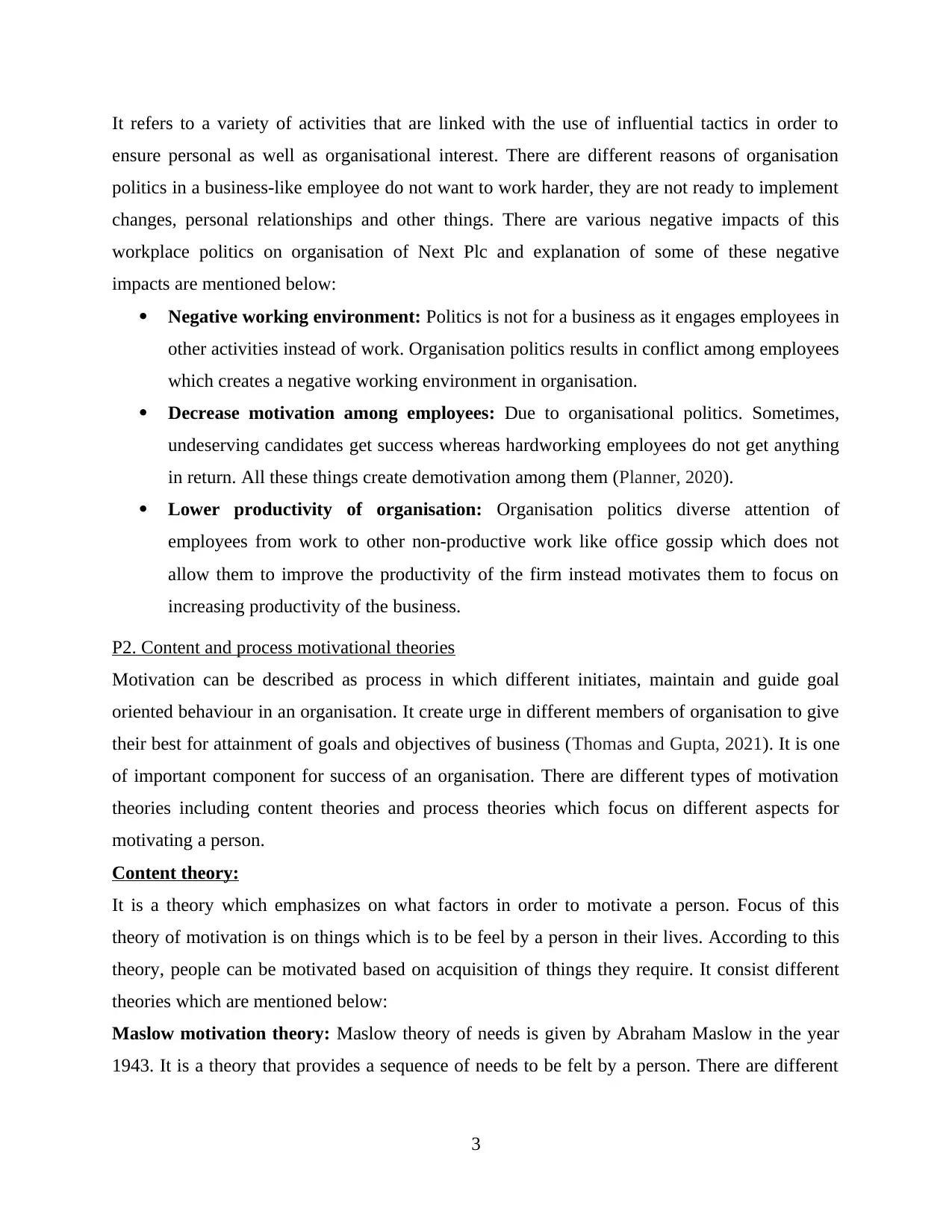
It refers to a variety of activities that are linked with the use of influential tactics in order to
ensure personal as well as organisational interest. There are different reasons of organisation
politics in a business-like employee do not want to work harder, they are not ready to implement
changes, personal relationships and other things. There are various negative impacts of this
workplace politics on organisation of Next Plc and explanation of some of these negative
impacts are mentioned below:
Negative working environment: Politics is not for a business as it engages employees in
other activities instead of work. Organisation politics results in conflict among employees
which creates a negative working environment in organisation.
Decrease motivation among employees: Due to organisational politics. Sometimes,
undeserving candidates get success whereas hardworking employees do not get anything
in return. All these things create demotivation among them (Planner, 2020).
Lower productivity of organisation: Organisation politics diverse attention of
employees from work to other non-productive work like office gossip which does not
allow them to improve the productivity of the firm instead motivates them to focus on
increasing productivity of the business.
P2. Content and process motivational theories
Motivation can be described as process in which different initiates, maintain and guide goal
oriented behaviour in an organisation. It create urge in different members of organisation to give
their best for attainment of goals and objectives of business (Thomas and Gupta, 2021). It is one
of important component for success of an organisation. There are different types of motivation
theories including content theories and process theories which focus on different aspects for
motivating a person.
Content theory:
It is a theory which emphasizes on what factors in order to motivate a person. Focus of this
theory of motivation is on things which is to be feel by a person in their lives. According to this
theory, people can be motivated based on acquisition of things they require. It consist different
theories which are mentioned below:
Maslow motivation theory: Maslow theory of needs is given by Abraham Maslow in the year
1943. It is a theory that provides a sequence of needs to be felt by a person. There are different
3
ensure personal as well as organisational interest. There are different reasons of organisation
politics in a business-like employee do not want to work harder, they are not ready to implement
changes, personal relationships and other things. There are various negative impacts of this
workplace politics on organisation of Next Plc and explanation of some of these negative
impacts are mentioned below:
Negative working environment: Politics is not for a business as it engages employees in
other activities instead of work. Organisation politics results in conflict among employees
which creates a negative working environment in organisation.
Decrease motivation among employees: Due to organisational politics. Sometimes,
undeserving candidates get success whereas hardworking employees do not get anything
in return. All these things create demotivation among them (Planner, 2020).
Lower productivity of organisation: Organisation politics diverse attention of
employees from work to other non-productive work like office gossip which does not
allow them to improve the productivity of the firm instead motivates them to focus on
increasing productivity of the business.
P2. Content and process motivational theories
Motivation can be described as process in which different initiates, maintain and guide goal
oriented behaviour in an organisation. It create urge in different members of organisation to give
their best for attainment of goals and objectives of business (Thomas and Gupta, 2021). It is one
of important component for success of an organisation. There are different types of motivation
theories including content theories and process theories which focus on different aspects for
motivating a person.
Content theory:
It is a theory which emphasizes on what factors in order to motivate a person. Focus of this
theory of motivation is on things which is to be feel by a person in their lives. According to this
theory, people can be motivated based on acquisition of things they require. It consist different
theories which are mentioned below:
Maslow motivation theory: Maslow theory of needs is given by Abraham Maslow in the year
1943. It is a theory that provides a sequence of needs to be felt by a person. There are different
3
⊘ This is a preview!⊘
Do you want full access?
Subscribe today to unlock all pages.

Trusted by 1+ million students worldwide
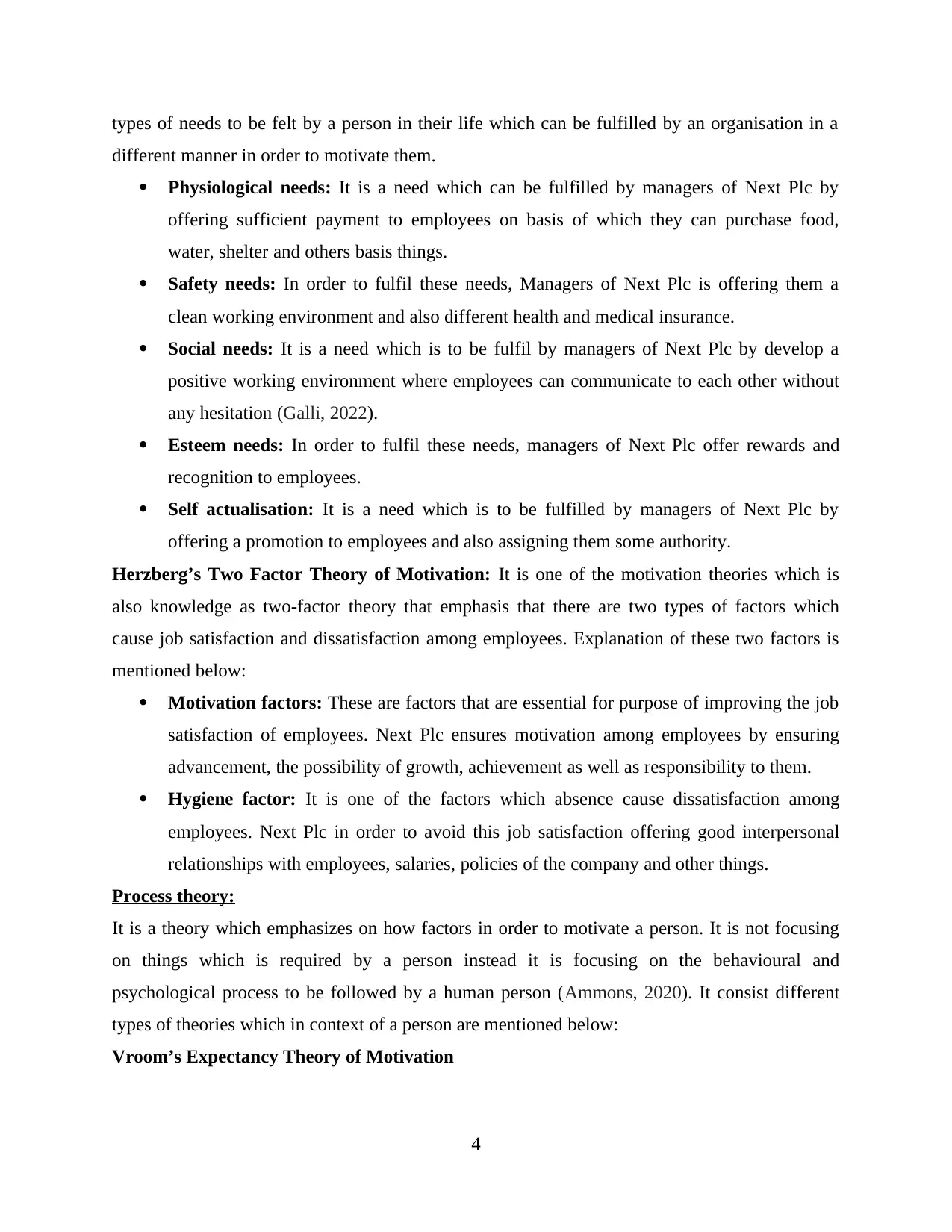
types of needs to be felt by a person in their life which can be fulfilled by an organisation in a
different manner in order to motivate them.
Physiological needs: It is a need which can be fulfilled by managers of Next Plc by
offering sufficient payment to employees on basis of which they can purchase food,
water, shelter and others basis things.
Safety needs: In order to fulfil these needs, Managers of Next Plc is offering them a
clean working environment and also different health and medical insurance.
Social needs: It is a need which is to be fulfil by managers of Next Plc by develop a
positive working environment where employees can communicate to each other without
any hesitation (Galli, 2022).
Esteem needs: In order to fulfil these needs, managers of Next Plc offer rewards and
recognition to employees.
Self actualisation: It is a need which is to be fulfilled by managers of Next Plc by
offering a promotion to employees and also assigning them some authority.
Herzberg’s Two Factor Theory of Motivation: It is one of the motivation theories which is
also knowledge as two-factor theory that emphasis that there are two types of factors which
cause job satisfaction and dissatisfaction among employees. Explanation of these two factors is
mentioned below:
Motivation factors: These are factors that are essential for purpose of improving the job
satisfaction of employees. Next Plc ensures motivation among employees by ensuring
advancement, the possibility of growth, achievement as well as responsibility to them.
Hygiene factor: It is one of the factors which absence cause dissatisfaction among
employees. Next Plc in order to avoid this job satisfaction offering good interpersonal
relationships with employees, salaries, policies of the company and other things.
Process theory:
It is a theory which emphasizes on how factors in order to motivate a person. It is not focusing
on things which is required by a person instead it is focusing on the behavioural and
psychological process to be followed by a human person (Ammons, 2020). It consist different
types of theories which in context of a person are mentioned below:
Vroom’s Expectancy Theory of Motivation
4
different manner in order to motivate them.
Physiological needs: It is a need which can be fulfilled by managers of Next Plc by
offering sufficient payment to employees on basis of which they can purchase food,
water, shelter and others basis things.
Safety needs: In order to fulfil these needs, Managers of Next Plc is offering them a
clean working environment and also different health and medical insurance.
Social needs: It is a need which is to be fulfil by managers of Next Plc by develop a
positive working environment where employees can communicate to each other without
any hesitation (Galli, 2022).
Esteem needs: In order to fulfil these needs, managers of Next Plc offer rewards and
recognition to employees.
Self actualisation: It is a need which is to be fulfilled by managers of Next Plc by
offering a promotion to employees and also assigning them some authority.
Herzberg’s Two Factor Theory of Motivation: It is one of the motivation theories which is
also knowledge as two-factor theory that emphasis that there are two types of factors which
cause job satisfaction and dissatisfaction among employees. Explanation of these two factors is
mentioned below:
Motivation factors: These are factors that are essential for purpose of improving the job
satisfaction of employees. Next Plc ensures motivation among employees by ensuring
advancement, the possibility of growth, achievement as well as responsibility to them.
Hygiene factor: It is one of the factors which absence cause dissatisfaction among
employees. Next Plc in order to avoid this job satisfaction offering good interpersonal
relationships with employees, salaries, policies of the company and other things.
Process theory:
It is a theory which emphasizes on how factors in order to motivate a person. It is not focusing
on things which is required by a person instead it is focusing on the behavioural and
psychological process to be followed by a human person (Ammons, 2020). It consist different
types of theories which in context of a person are mentioned below:
Vroom’s Expectancy Theory of Motivation
4
Paraphrase This Document
Need a fresh take? Get an instant paraphrase of this document with our AI Paraphraser
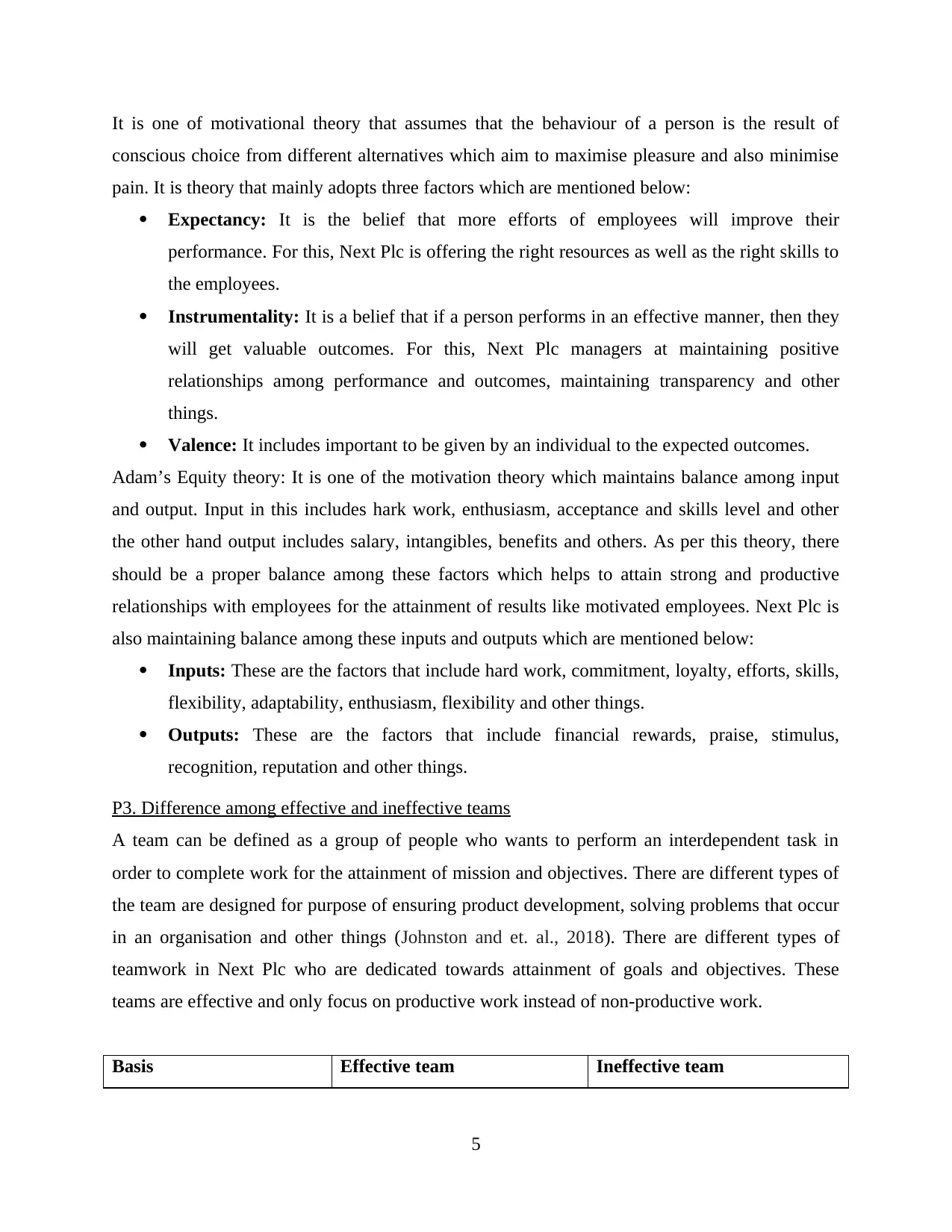
It is one of motivational theory that assumes that the behaviour of a person is the result of
conscious choice from different alternatives which aim to maximise pleasure and also minimise
pain. It is theory that mainly adopts three factors which are mentioned below:
Expectancy: It is the belief that more efforts of employees will improve their
performance. For this, Next Plc is offering the right resources as well as the right skills to
the employees.
Instrumentality: It is a belief that if a person performs in an effective manner, then they
will get valuable outcomes. For this, Next Plc managers at maintaining positive
relationships among performance and outcomes, maintaining transparency and other
things.
Valence: It includes important to be given by an individual to the expected outcomes.
Adam’s Equity theory: It is one of the motivation theory which maintains balance among input
and output. Input in this includes hark work, enthusiasm, acceptance and skills level and other
the other hand output includes salary, intangibles, benefits and others. As per this theory, there
should be a proper balance among these factors which helps to attain strong and productive
relationships with employees for the attainment of results like motivated employees. Next Plc is
also maintaining balance among these inputs and outputs which are mentioned below:
Inputs: These are the factors that include hard work, commitment, loyalty, efforts, skills,
flexibility, adaptability, enthusiasm, flexibility and other things.
Outputs: These are the factors that include financial rewards, praise, stimulus,
recognition, reputation and other things.
P3. Difference among effective and ineffective teams
A team can be defined as a group of people who wants to perform an interdependent task in
order to complete work for the attainment of mission and objectives. There are different types of
the team are designed for purpose of ensuring product development, solving problems that occur
in an organisation and other things (Johnston and et. al., 2018). There are different types of
teamwork in Next Plc who are dedicated towards attainment of goals and objectives. These
teams are effective and only focus on productive work instead of non-productive work.
Basis Effective team Ineffective team
5
conscious choice from different alternatives which aim to maximise pleasure and also minimise
pain. It is theory that mainly adopts three factors which are mentioned below:
Expectancy: It is the belief that more efforts of employees will improve their
performance. For this, Next Plc is offering the right resources as well as the right skills to
the employees.
Instrumentality: It is a belief that if a person performs in an effective manner, then they
will get valuable outcomes. For this, Next Plc managers at maintaining positive
relationships among performance and outcomes, maintaining transparency and other
things.
Valence: It includes important to be given by an individual to the expected outcomes.
Adam’s Equity theory: It is one of the motivation theory which maintains balance among input
and output. Input in this includes hark work, enthusiasm, acceptance and skills level and other
the other hand output includes salary, intangibles, benefits and others. As per this theory, there
should be a proper balance among these factors which helps to attain strong and productive
relationships with employees for the attainment of results like motivated employees. Next Plc is
also maintaining balance among these inputs and outputs which are mentioned below:
Inputs: These are the factors that include hard work, commitment, loyalty, efforts, skills,
flexibility, adaptability, enthusiasm, flexibility and other things.
Outputs: These are the factors that include financial rewards, praise, stimulus,
recognition, reputation and other things.
P3. Difference among effective and ineffective teams
A team can be defined as a group of people who wants to perform an interdependent task in
order to complete work for the attainment of mission and objectives. There are different types of
the team are designed for purpose of ensuring product development, solving problems that occur
in an organisation and other things (Johnston and et. al., 2018). There are different types of
teamwork in Next Plc who are dedicated towards attainment of goals and objectives. These
teams are effective and only focus on productive work instead of non-productive work.
Basis Effective team Ineffective team
5
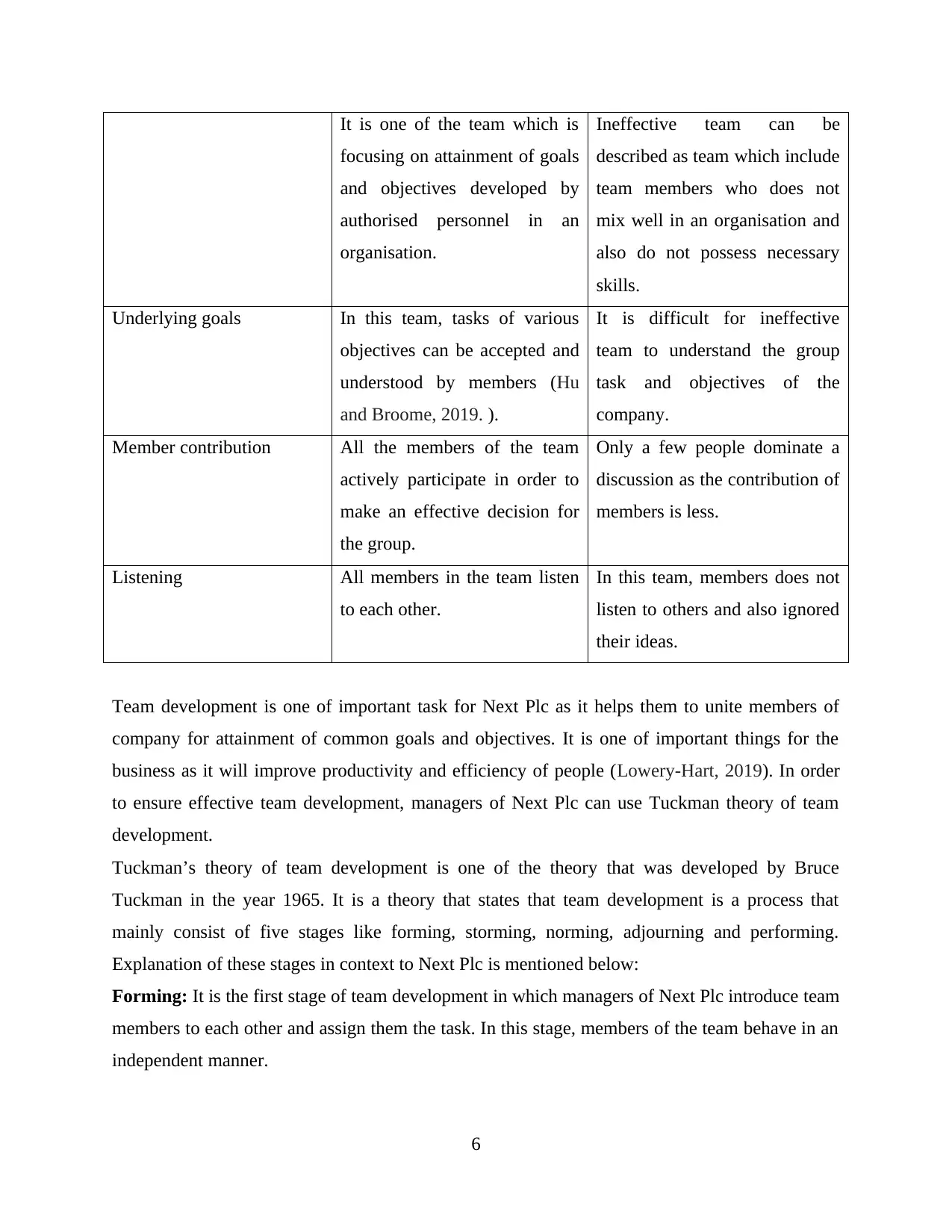
It is one of the team which is
focusing on attainment of goals
and objectives developed by
authorised personnel in an
organisation.
Ineffective team can be
described as team which include
team members who does not
mix well in an organisation and
also do not possess necessary
skills.
Underlying goals In this team, tasks of various
objectives can be accepted and
understood by members (Hu
and Broome, 2019. ).
It is difficult for ineffective
team to understand the group
task and objectives of the
company.
Member contribution All the members of the team
actively participate in order to
make an effective decision for
the group.
Only a few people dominate a
discussion as the contribution of
members is less.
Listening All members in the team listen
to each other.
In this team, members does not
listen to others and also ignored
their ideas.
Team development is one of important task for Next Plc as it helps them to unite members of
company for attainment of common goals and objectives. It is one of important things for the
business as it will improve productivity and efficiency of people (Lowery-Hart, 2019). In order
to ensure effective team development, managers of Next Plc can use Tuckman theory of team
development.
Tuckman’s theory of team development is one of the theory that was developed by Bruce
Tuckman in the year 1965. It is a theory that states that team development is a process that
mainly consist of five stages like forming, storming, norming, adjourning and performing.
Explanation of these stages in context to Next Plc is mentioned below:
Forming: It is the first stage of team development in which managers of Next Plc introduce team
members to each other and assign them the task. In this stage, members of the team behave in an
independent manner.
6
focusing on attainment of goals
and objectives developed by
authorised personnel in an
organisation.
Ineffective team can be
described as team which include
team members who does not
mix well in an organisation and
also do not possess necessary
skills.
Underlying goals In this team, tasks of various
objectives can be accepted and
understood by members (Hu
and Broome, 2019. ).
It is difficult for ineffective
team to understand the group
task and objectives of the
company.
Member contribution All the members of the team
actively participate in order to
make an effective decision for
the group.
Only a few people dominate a
discussion as the contribution of
members is less.
Listening All members in the team listen
to each other.
In this team, members does not
listen to others and also ignored
their ideas.
Team development is one of important task for Next Plc as it helps them to unite members of
company for attainment of common goals and objectives. It is one of important things for the
business as it will improve productivity and efficiency of people (Lowery-Hart, 2019). In order
to ensure effective team development, managers of Next Plc can use Tuckman theory of team
development.
Tuckman’s theory of team development is one of the theory that was developed by Bruce
Tuckman in the year 1965. It is a theory that states that team development is a process that
mainly consist of five stages like forming, storming, norming, adjourning and performing.
Explanation of these stages in context to Next Plc is mentioned below:
Forming: It is the first stage of team development in which managers of Next Plc introduce team
members to each other and assign them the task. In this stage, members of the team behave in an
independent manner.
6
⊘ This is a preview!⊘
Do you want full access?
Subscribe today to unlock all pages.

Trusted by 1+ million students worldwide
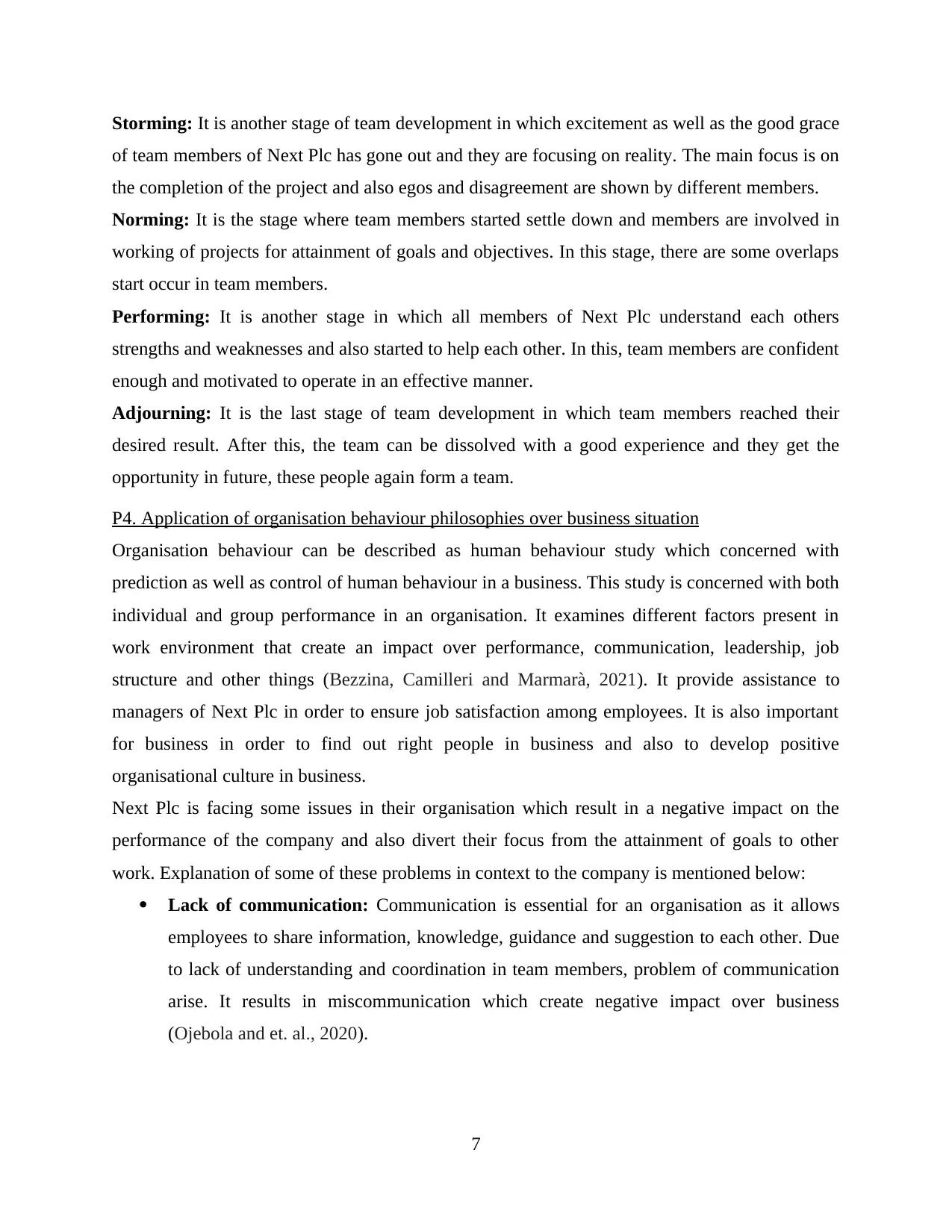
Storming: It is another stage of team development in which excitement as well as the good grace
of team members of Next Plc has gone out and they are focusing on reality. The main focus is on
the completion of the project and also egos and disagreement are shown by different members.
Norming: It is the stage where team members started settle down and members are involved in
working of projects for attainment of goals and objectives. In this stage, there are some overlaps
start occur in team members.
Performing: It is another stage in which all members of Next Plc understand each others
strengths and weaknesses and also started to help each other. In this, team members are confident
enough and motivated to operate in an effective manner.
Adjourning: It is the last stage of team development in which team members reached their
desired result. After this, the team can be dissolved with a good experience and they get the
opportunity in future, these people again form a team.
P4. Application of organisation behaviour philosophies over business situation
Organisation behaviour can be described as human behaviour study which concerned with
prediction as well as control of human behaviour in a business. This study is concerned with both
individual and group performance in an organisation. It examines different factors present in
work environment that create an impact over performance, communication, leadership, job
structure and other things (Bezzina, Camilleri and Marmarà, 2021). It provide assistance to
managers of Next Plc in order to ensure job satisfaction among employees. It is also important
for business in order to find out right people in business and also to develop positive
organisational culture in business.
Next Plc is facing some issues in their organisation which result in a negative impact on the
performance of the company and also divert their focus from the attainment of goals to other
work. Explanation of some of these problems in context to the company is mentioned below:
Lack of communication: Communication is essential for an organisation as it allows
employees to share information, knowledge, guidance and suggestion to each other. Due
to lack of understanding and coordination in team members, problem of communication
arise. It results in miscommunication which create negative impact over business
(Ojebola and et. al., 2020).
7
of team members of Next Plc has gone out and they are focusing on reality. The main focus is on
the completion of the project and also egos and disagreement are shown by different members.
Norming: It is the stage where team members started settle down and members are involved in
working of projects for attainment of goals and objectives. In this stage, there are some overlaps
start occur in team members.
Performing: It is another stage in which all members of Next Plc understand each others
strengths and weaknesses and also started to help each other. In this, team members are confident
enough and motivated to operate in an effective manner.
Adjourning: It is the last stage of team development in which team members reached their
desired result. After this, the team can be dissolved with a good experience and they get the
opportunity in future, these people again form a team.
P4. Application of organisation behaviour philosophies over business situation
Organisation behaviour can be described as human behaviour study which concerned with
prediction as well as control of human behaviour in a business. This study is concerned with both
individual and group performance in an organisation. It examines different factors present in
work environment that create an impact over performance, communication, leadership, job
structure and other things (Bezzina, Camilleri and Marmarà, 2021). It provide assistance to
managers of Next Plc in order to ensure job satisfaction among employees. It is also important
for business in order to find out right people in business and also to develop positive
organisational culture in business.
Next Plc is facing some issues in their organisation which result in a negative impact on the
performance of the company and also divert their focus from the attainment of goals to other
work. Explanation of some of these problems in context to the company is mentioned below:
Lack of communication: Communication is essential for an organisation as it allows
employees to share information, knowledge, guidance and suggestion to each other. Due
to lack of understanding and coordination in team members, problem of communication
arise. It results in miscommunication which create negative impact over business
(Ojebola and et. al., 2020).
7
Paraphrase This Document
Need a fresh take? Get an instant paraphrase of this document with our AI Paraphraser
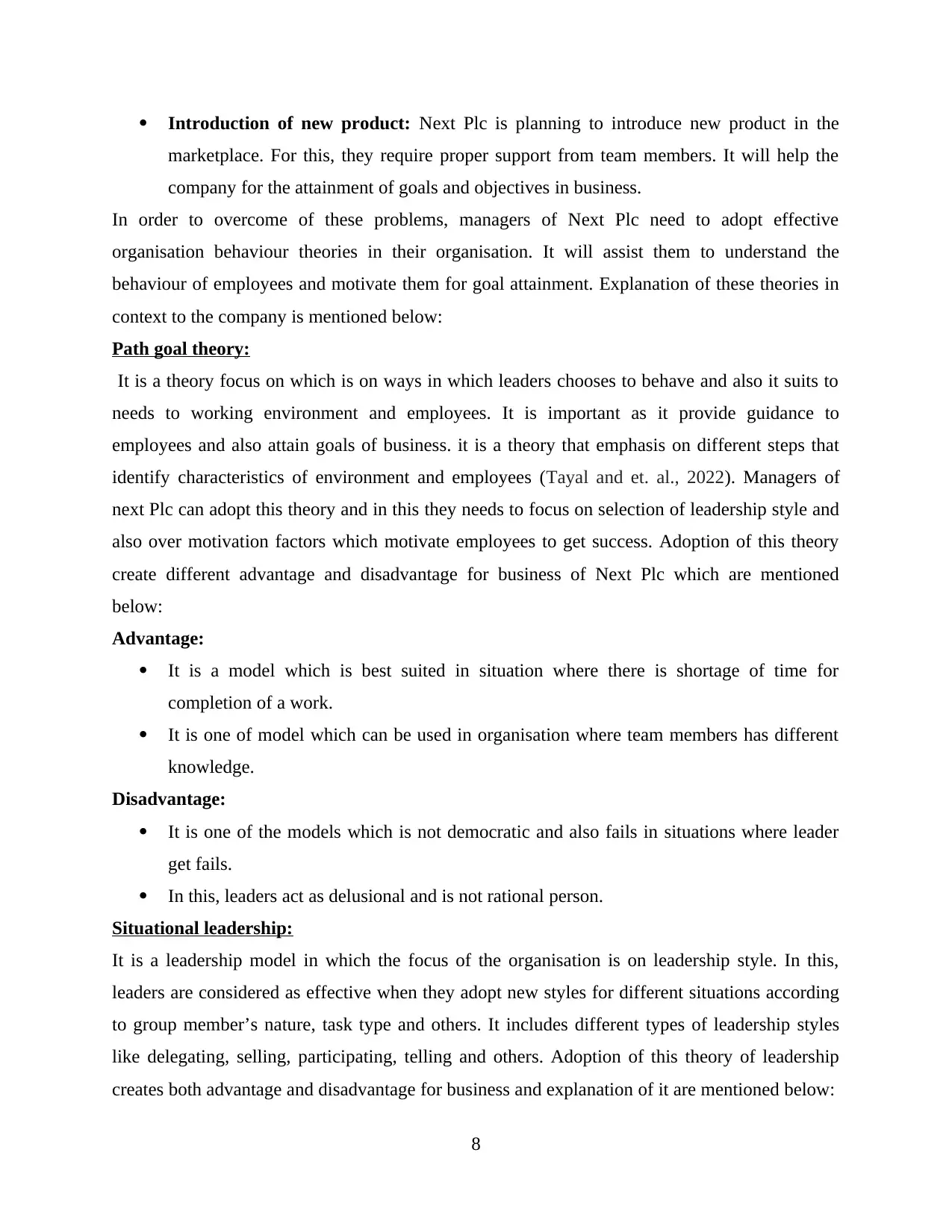
Introduction of new product: Next Plc is planning to introduce new product in the
marketplace. For this, they require proper support from team members. It will help the
company for the attainment of goals and objectives in business.
In order to overcome of these problems, managers of Next Plc need to adopt effective
organisation behaviour theories in their organisation. It will assist them to understand the
behaviour of employees and motivate them for goal attainment. Explanation of these theories in
context to the company is mentioned below:
Path goal theory:
It is a theory focus on which is on ways in which leaders chooses to behave and also it suits to
needs to working environment and employees. It is important as it provide guidance to
employees and also attain goals of business. it is a theory that emphasis on different steps that
identify characteristics of environment and employees (Tayal and et. al., 2022). Managers of
next Plc can adopt this theory and in this they needs to focus on selection of leadership style and
also over motivation factors which motivate employees to get success. Adoption of this theory
create different advantage and disadvantage for business of Next Plc which are mentioned
below:
Advantage:
It is a model which is best suited in situation where there is shortage of time for
completion of a work.
It is one of model which can be used in organisation where team members has different
knowledge.
Disadvantage:
It is one of the models which is not democratic and also fails in situations where leader
get fails.
In this, leaders act as delusional and is not rational person.
Situational leadership:
It is a leadership model in which the focus of the organisation is on leadership style. In this,
leaders are considered as effective when they adopt new styles for different situations according
to group member’s nature, task type and others. It includes different types of leadership styles
like delegating, selling, participating, telling and others. Adoption of this theory of leadership
creates both advantage and disadvantage for business and explanation of it are mentioned below:
8
marketplace. For this, they require proper support from team members. It will help the
company for the attainment of goals and objectives in business.
In order to overcome of these problems, managers of Next Plc need to adopt effective
organisation behaviour theories in their organisation. It will assist them to understand the
behaviour of employees and motivate them for goal attainment. Explanation of these theories in
context to the company is mentioned below:
Path goal theory:
It is a theory focus on which is on ways in which leaders chooses to behave and also it suits to
needs to working environment and employees. It is important as it provide guidance to
employees and also attain goals of business. it is a theory that emphasis on different steps that
identify characteristics of environment and employees (Tayal and et. al., 2022). Managers of
next Plc can adopt this theory and in this they needs to focus on selection of leadership style and
also over motivation factors which motivate employees to get success. Adoption of this theory
create different advantage and disadvantage for business of Next Plc which are mentioned
below:
Advantage:
It is a model which is best suited in situation where there is shortage of time for
completion of a work.
It is one of model which can be used in organisation where team members has different
knowledge.
Disadvantage:
It is one of the models which is not democratic and also fails in situations where leader
get fails.
In this, leaders act as delusional and is not rational person.
Situational leadership:
It is a leadership model in which the focus of the organisation is on leadership style. In this,
leaders are considered as effective when they adopt new styles for different situations according
to group member’s nature, task type and others. It includes different types of leadership styles
like delegating, selling, participating, telling and others. Adoption of this theory of leadership
creates both advantage and disadvantage for business and explanation of it are mentioned below:
8
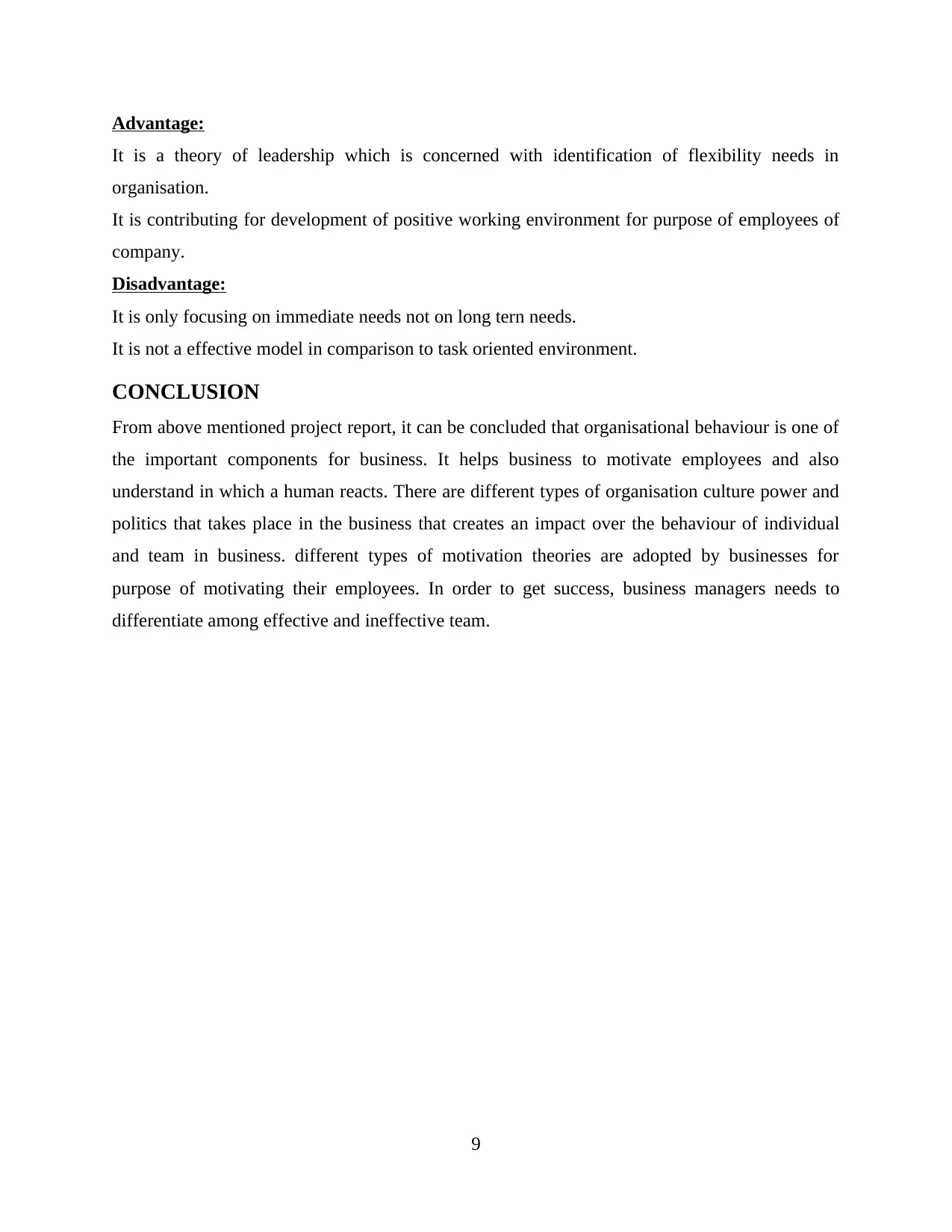
Advantage:
It is a theory of leadership which is concerned with identification of flexibility needs in
organisation.
It is contributing for development of positive working environment for purpose of employees of
company.
Disadvantage:
It is only focusing on immediate needs not on long tern needs.
It is not a effective model in comparison to task oriented environment.
CONCLUSION
From above mentioned project report, it can be concluded that organisational behaviour is one of
the important components for business. It helps business to motivate employees and also
understand in which a human reacts. There are different types of organisation culture power and
politics that takes place in the business that creates an impact over the behaviour of individual
and team in business. different types of motivation theories are adopted by businesses for
purpose of motivating their employees. In order to get success, business managers needs to
differentiate among effective and ineffective team.
9
It is a theory of leadership which is concerned with identification of flexibility needs in
organisation.
It is contributing for development of positive working environment for purpose of employees of
company.
Disadvantage:
It is only focusing on immediate needs not on long tern needs.
It is not a effective model in comparison to task oriented environment.
CONCLUSION
From above mentioned project report, it can be concluded that organisational behaviour is one of
the important components for business. It helps business to motivate employees and also
understand in which a human reacts. There are different types of organisation culture power and
politics that takes place in the business that creates an impact over the behaviour of individual
and team in business. different types of motivation theories are adopted by businesses for
purpose of motivating their employees. In order to get success, business managers needs to
differentiate among effective and ineffective team.
9
⊘ This is a preview!⊘
Do you want full access?
Subscribe today to unlock all pages.

Trusted by 1+ million students worldwide
1 out of 14
Related Documents
Your All-in-One AI-Powered Toolkit for Academic Success.
+13062052269
info@desklib.com
Available 24*7 on WhatsApp / Email
![[object Object]](/_next/static/media/star-bottom.7253800d.svg)
Unlock your academic potential
Copyright © 2020–2026 A2Z Services. All Rights Reserved. Developed and managed by ZUCOL.




